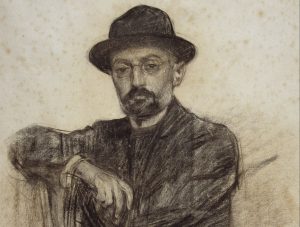“Envying another man’s happiness is madness; you wouldn’t know what to do with it if you had it.”
Winner of the Nobel Prize in Literature in 1947, André Gide was a French writer distinguished for his explorations of the human conflict between narrow social moralism and freedom and empowerment through self-discovery. The Immoralist is one of his most famous works, a confession of man’s nature and obsession with immorality. The protagonist, Marcel, begins his story with his marriage to gentle Marceline, a decision made out of familial duty. On their honeymoon in Tunisia, he falls deathly ill with tuberculosis and undergoes a transformation through convalescence. Marcel returns from the brink of death morally and sexually awakened, soul aflame with a newfound passion for life, stubbornly attached to the guilty pleasures of immorality and the strength of his own sinful desires.
A fascinating example of the repressed man, constrained by prevailing ethical prescriptions, and stifled by society’s prohibition of homosexuality, Marcel represents the main exploration of Gide’s works, the reconciliation between individuality and society-imposed moralism. His increasing awareness of his own sensuality invokes the image of Velazquez’s Rokeby Venus and marks his descent into debauchery. The reader, however, is continuously seduced by the confrontation of instinct and reason, by Gide’s beautiful descriptions of North African landscapes and climate, by the wickedly sublime emotional nuances of Marcels’ journey, and by his evocative contemplations on beauty, art, and freedom. Despite the easy identification of moral atrophy, the reader finds herself voluntarily and willfully blurring the lines between right and wrong, excusing and even rooting for Marcel.
His obsession with life is electrifying, driving him to live precariously in an effort to aggravate and intensify it. His fixation on freedom is exhilarating, urging him to discover and embrace his individuality and sexuality. His ability to draw all of this back to a simple pursuit of happiness is painfully applicable and tied to the desire to get free and live freely. The transformation into a deluded, egotistical libertine is almost justified by his dutiful bouts of devotion to his sick wife and indignant rejection of elitism, but his unrestrained pursuit of pleasure ultimately makes him inexcusably cruel in his treatment of his wife and predatory in his sexual advances.
The selfish individualism so captivatingly described is the inevitable eruption of the repressed man, the pursuit of liberation sought by modernity. However, the confessional nature of the novel paired with the final depravity of Marcel reveals the danger of this liberation. In its relevance to a modern world obsessed with individuality, uniqueness, and postmodern destruction of systems and structures, The Immoralist is a mesmerizing exploration of the constraints on man and what it means to be free. As Gide succinctly posits,
“The capacity to get free is nothing; the capacity to be free is the task.”







[…] Lessons From Literature: The Immoralist – The George Town Voice […]